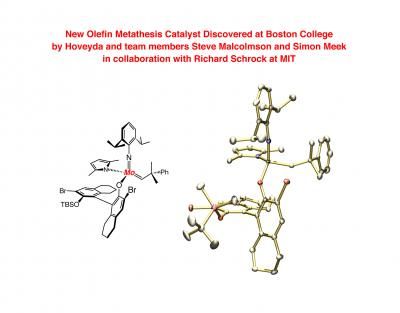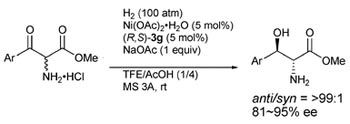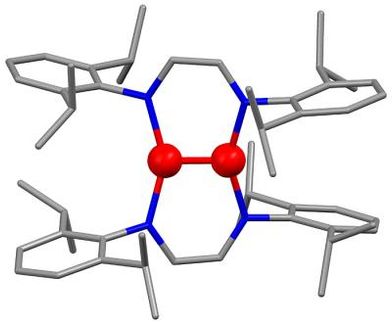New catalysts promise faster, cleaner and more efficient research platform
Boston College and MIT researchers detail new class of catalysts
A new class of exceptionally effective catalysts that promote the powerful Olefin Metathesis reaction has been discovered by a team of Boston College and MIT scientists, opening up a vast new scientific platform to researchers in medicine, biology and materials.

A team of researchers led by Boston College Prof. Amir H. Hoveyda and MIT Prof. and Nobel laureate Richard R. Schrock have discovered a new class of catalysts for the powerful olefin metathesis reaction, illustrated here, which transforms simple molecules into complex ones. The process is critical to new research in medicine, biology and materials science.
Illustration courtesy of Nature.
The new catalysts can be easily prepared and possess unique features never before utilized by chemists, according to findings from a team led by Boston College Prof. Amir H. Hoveyda and MIT Prof. and Nobel laureate Richard Schrock, who shared the 2005 prize in Chemistry for early discoveries of catalytic olefin metathesis. The team's findings are reported in the current online edition of the journal Nature.
"In order for chemists to gain access to molecules that can enhance the quality of human life, we need reliable, highly efficient, selective and environmentally friendly chemical reactions," said Hoveyda, the Joseph T. and Patricia Vanderslice Millennium Professor and Chemistry Department chairman at BC. "Discovering catalysts that promote these transformations is one of the great challenges of modern chemistry."
Catalytic olefin metathesis transforms simple molecules into complex ones. But a chief challenge has been developing catalysts to this organic chemical reaction that are practical and offer exceptional selectivity for a significantly broader range of reactions.
Schrock, the Frederick G. Keyes Professor of Chemistry at MIT, said the unprecedented level of control the new class of catalysts provides will advance research across multiple fields.
"We expect this highly flexible palette of catalysts to be useful for a wide variety of catalytic reactions that are catalyzed by a high oxidation state alkylidene species, and to be able to design catalytic metathesis reactions with a control that has rarely if ever been observed before," Schrock said.
Highly versatile molecules that contain carbon–carbon double bonds, alkenes, or olefins, are ubiquitous in medicinally relevant and biologically active molecules. Tetrahedral in constitution, the new catalysts are the first to exploit a metal with four different ligands – molecules that bond to the central metal – which in turn dictate the catalysts' high level of reactivity and selectivity.
"For the first time these catalysts take advantage of the configuration of a metal with four different ligands attached to it, an untested situation that has long been predicted to be a strong director of asymmetric catalytic reactions that take place at the metal center," said Schrock.
Unique to this catalyst is the metal molybdenum as a source of chirality, also known as "handedness." Like the mirror image of left hand and right, molecules can come in two variations, one a reflection of the other. But these two variations often function in entirely different ways – sometimes one proves harmful, while the other is benign.
With molybdenum at its core, the new catalyst gives chemists a simple, unique and efficient way to produce one form of the molecule or the other in order to yield the desired reactions.
The new catalysts are also structurally flexible, a relatively unconventional attribute that lends them exceptional chemical activity. The discovery of catalysts with stable configurations and flexible structures is expected to allow chemists to design, prepare and develop new chemical transformations that furnish unprecedented levels of reactivity and selectivity, according to the co-authors, which include BC researchers Steven J. Malcolmson, Simon J. Meek, and Elizabeth S. Sattely.
Most read news
Topics
Organizations
Other news from the department science

Get the chemical industry in your inbox
By submitting this form you agree that LUMITOS AG will send you the newsletter(s) selected above by email. Your data will not be passed on to third parties. Your data will be stored and processed in accordance with our data protection regulations. LUMITOS may contact you by email for the purpose of advertising or market and opinion surveys. You can revoke your consent at any time without giving reasons to LUMITOS AG, Ernst-Augustin-Str. 2, 12489 Berlin, Germany or by e-mail at revoke@lumitos.com with effect for the future. In addition, each email contains a link to unsubscribe from the corresponding newsletter.





























































